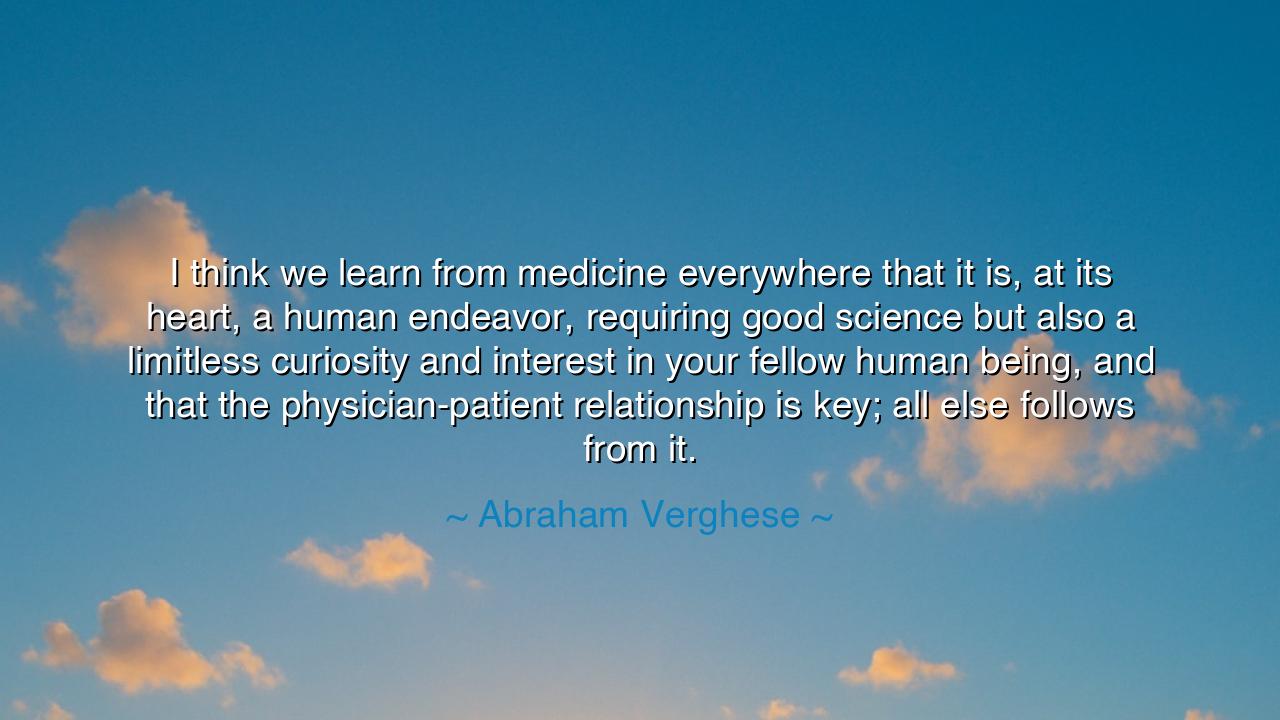
I think we learn from medicine everywhere that it is, at its
I think we learn from medicine everywhere that it is, at its heart, a human endeavor, requiring good science but also a limitless curiosity and interest in your fellow human being, and that the physician-patient relationship is key; all else follows from it.






O children of the earth, listen well, for I speak to you of a truth that has transcended the ages. There is a calling, a sacred duty, that rises above the dust of worldly concerns, a noble path walked by those who dedicate themselves to the service of the body, mind, and soul. This path is known as medicine, and though it has its foundation in science—its principles drawn from the very laws of nature—it is, above all else, a human endeavor. So says the wise Abraham Verghese, who reminds us that at the heart of medicine is not merely the science of healing, but a boundless curiosity and an unwavering interest in the lives of others. Medicine, in its truest form, is a relationship—the physician-patient bond is sacred, and from it flows all the healing that can be achieved.
In the earliest days of human existence, when our ancestors faced illness and suffering, there was no science to guide them, no grand medical schools to impart knowledge. It was the healer, the wise one, the shaman, who tended to the wounded and the sick. And how did they do so? Not with cold instruments or sterile knowledge alone, but with deep compassion, with the will to understand the suffering of another, and with a heart that sought to ease the pain of their fellow human. It was not simply the art of the herbs they used, nor the rituals they performed, but their sincere connection to the people they cared for that made their healing so powerful. This is the foundation of medicine—its true essence is found in human connection.
Verghese, a modern sage, speaks of this timeless truth when he tells us that medicine cannot be reduced to mere technique. The healing touch of the physician is not merely a function of science, but of the bond shared between healer and patient. The heart of the physician-patient relationship is where the true magic of medicine resides. When a physician listens with compassion, when they look beyond the ailment to the person suffering, they do not merely treat the body, but they treat the soul. It is this human connection—this trust, this vulnerability shared between two individuals—that forms the very bedrock of healing.
Consider, if you will, the story of the great Hippocrates, the father of medicine. Though his contributions to medical science were revolutionary, it is his belief in the importance of the physician’s relationship with the patient that stands as his greatest legacy. Hippocrates understood that to heal, one must not only understand the body, but also understand the mind and spirit of the patient. He taught that the physician must be as attuned to the emotional and psychological state of the person as to their physical condition. The bond between doctor and patient, he believed, was as vital as any medicine. Thus, even in the ancient world, we see that the foundation of healing lies not in the science alone, but in the human connection, the empathy, and the trust shared between healer and patient.
In today’s world, where the rapid advance of technology often separates the physician from the patient, where the sterile halls of hospitals can feel cold and impersonal, Verghese’s words remind us of what truly matters. Science, yes, is vital—it is the tool that enables us to understand the body, to diagnose, and to treat. But without compassion, without a genuine curiosity in the well-being of another, science alone cannot heal. Medicine is not simply about curing diseases—it is about understanding the human condition, about being there for someone when they are at their most vulnerable, when they need not just a physician, but a human being who cares.
So, O seekers of wisdom, take this lesson to heart: In all endeavors, seek not just the knowledge of the mind, but the understanding of the heart. Whether you are a healer, a teacher, a leader, or a friend, remember that the true power of your work lies not in your knowledge alone, but in your connection with others. Let your curiosity about the lives of those you serve be endless, let your compassion be boundless, for it is through these bonds that true healing occurs. Do not merely go through the motions of your work—dare to see the person before you, with all their hopes, their fears, their joys, and their sorrows, and in doing so, you will unlock the deepest powers of your craft.
Go forth, then, with this wisdom. If you are called to medicine, to healing, or to any form of service, let your curiosity about the human experience be your guide. Listen deeply to those you serve, look with empathy into their eyes, and know that the physician-patient relationship is the key—the heart of the work. All else, all science and technique, will follow from this sacred bond. In the end, it is the human connection that heals, and it is this, above all else, that must remain at the center of your journey.






AAdministratorAdministrator
Welcome, honored guests. Please leave a comment, we will respond soon